 Please read Plautus' The Swaggering Soldier (Miles Gloriosus) . Cite a line from this play that shows something about Roman society or Roman history one might not learn from a more conventional historical source, e.g., something about day-to-day life in Rome, something about Roman values, or something about the Roman sense of humor. Explain why you chose this particular line. Alternatively, note somethng Plautus has done with one of the five "narrative essentials" (plot, character, theme, setting, and tone) that shows something important about Roman history.
Please read Plautus' The Swaggering Soldier (Miles Gloriosus) . Cite a line from this play that shows something about Roman society or Roman history one might not learn from a more conventional historical source, e.g., something about day-to-day life in Rome, something about Roman values, or something about the Roman sense of humor. Explain why you chose this particular line. Alternatively, note somethng Plautus has done with one of the five "narrative essentials" (plot, character, theme, setting, and tone) that shows something important about Roman history.
Tuesday, September 30, 2008
The Swaggering Solidier (Plautus)
 Please read Plautus' The Swaggering Soldier (Miles Gloriosus) . Cite a line from this play that shows something about Roman society or Roman history one might not learn from a more conventional historical source, e.g., something about day-to-day life in Rome, something about Roman values, or something about the Roman sense of humor. Explain why you chose this particular line. Alternatively, note somethng Plautus has done with one of the five "narrative essentials" (plot, character, theme, setting, and tone) that shows something important about Roman history.
Please read Plautus' The Swaggering Soldier (Miles Gloriosus) . Cite a line from this play that shows something about Roman society or Roman history one might not learn from a more conventional historical source, e.g., something about day-to-day life in Rome, something about Roman values, or something about the Roman sense of humor. Explain why you chose this particular line. Alternatively, note somethng Plautus has done with one of the five "narrative essentials" (plot, character, theme, setting, and tone) that shows something important about Roman history.
Thursday, September 25, 2008
Marius and Sulla
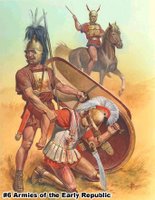 Marius and Sulla were both in some ways a great Roman heroes. However, each also contributed to bringing disaster on Rome.
Marius and Sulla were both in some ways a great Roman heroes. However, each also contributed to bringing disaster on Rome.Please read Plutarch's Life of Marius, either in the abridged version here or the unabridged version here. Then read Plutarch's Life of Sulla, either in the abridged version here or the unabridged version here.
Cite an example that helps build the case that one of these men was a great hero for Rome *or* cite an example that shows how one of these men brought disaster to Rome.
Tuesday, September 23, 2008
Sallust on the War with Jugurtha
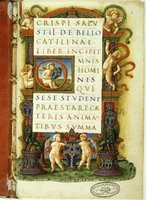 Please read the introduction to Sallust's War with Jugurtha. Pick out what you consider to be the most important/most interesting line from this selection. If other students have chosen a different line, explain why *your* line is even more important or more interesting.
Please read the introduction to Sallust's War with Jugurtha. Pick out what you consider to be the most important/most interesting line from this selection. If other students have chosen a different line, explain why *your* line is even more important or more interesting. As an alternative, pick out the line from Sallust you consider the worst, or the least interesting. If other students have chosen a different line, explain why your line is even worse or less interesting.
Monday, September 22, 2008
Selections from Plutarch
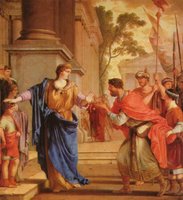 "All history is biography," said Emerson, and he's certainly right in thinking that an understanding of the lives of individual men and women is essential to history. Fortunately for us, many ancient writers shared Emerson's idea of the importance of biography, and they've left us many fascinating accounts of important Roman leaders. Among the most interesting biographies are those contained in Plutarch's "Lives of the Noble Greeks and Romans." Please read one of the following selections from Plutarch. Cite an incident or sentiment that seems to you particular important in understanding Roman character/values/history, and explain why you chose this particular passage/event.
"All history is biography," said Emerson, and he's certainly right in thinking that an understanding of the lives of individual men and women is essential to history. Fortunately for us, many ancient writers shared Emerson's idea of the importance of biography, and they've left us many fascinating accounts of important Roman leaders. Among the most interesting biographies are those contained in Plutarch's "Lives of the Noble Greeks and Romans." Please read one of the following selections from Plutarch. Cite an incident or sentiment that seems to you particular important in understanding Roman character/values/history, and explain why you chose this particular passage/event.Abridged versions:
Tiberius Gracchus, Gaius Gracchus, Fabius Maximus, Cato the Elder, Camillus
Unabridged versions:
Tiberius Gracchus, Gaius Gracchus, Fabius Maximus, Cato the Elder, Camillus
Tuesday, September 16, 2008
Selections on Roman Warfare
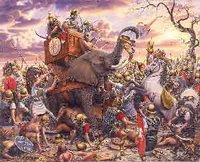 Sorry I missed class Tuesday. I hope your discussion of the Twelve Tables went well. Thanks to whoever passed around the "sign your name quiz"! On Thursday, I plan to finish up the struggle of orders and then talk about Roman warfare during the Republic. Since I am going to be condensing material, the readings below (and the material in the Africa book) are especially important.
Sorry I missed class Tuesday. I hope your discussion of the Twelve Tables went well. Thanks to whoever passed around the "sign your name quiz"! On Thursday, I plan to finish up the struggle of orders and then talk about Roman warfare during the Republic. Since I am going to be condensing material, the readings below (and the material in the Africa book) are especially important.Times of war tend to bring out both the strengths and weaknesses of a society. This is particularly true of Republican Rome. Please read through one or two of the selections linked below. Pick out an incident/passage that shows either the surprising nature of Roman success or one of the characteristics of Republican Rome that makes that success not so surprising.
Selections you should find interesting include: Livy's description of the Roman method of declaring war, Livy's account of the war with and eventual destruction of Veii (Book V, sections 1-23), Livy's account of the Sack of Rome by the Gauls and Camillus' rescue of Rome (Book V, sections 33-55), Polybius' description of The Battle of Cannae, Polybius' comparison of the Roman maniple to the Macedonian phalanx, and Polybius' description of Roman government.
Tuesday, September 9, 2008
The Twelve Tables
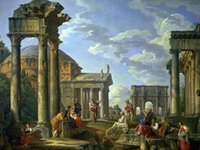 Please read through this translation of the the Twelve Tables, Rome's first written laws (also available in an abridged version here). How impressed are you with this law code? Cite an example of what you consider to be a particularly good law or a particularly bad law from this code. Explain how the law you cite would have tended to either strengthen or weaken the Roman Republic.
Please read through this translation of the the Twelve Tables, Rome's first written laws (also available in an abridged version here). How impressed are you with this law code? Cite an example of what you consider to be a particularly good law or a particularly bad law from this code. Explain how the law you cite would have tended to either strengthen or weaken the Roman Republic.
Thursday, September 4, 2008
Livy I
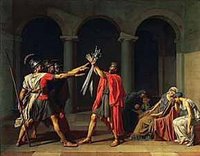 Please read the Preface and Book I of Livy's History of Rome (also available here). Read the preface carefully. Skim through Book I, concentrating on stories you find particularly interesting.
Please read the Preface and Book I of Livy's History of Rome (also available here). Read the preface carefully. Skim through Book I, concentrating on stories you find particularly interesting.Which of the Livy stories/characters in this section do you find most interesting? How much historical worth do you think there is to this story? What does that story teach about Roman values?
Subscribe to:
Comments (Atom)
